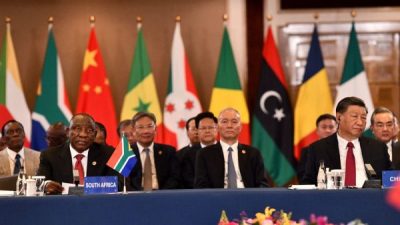BRICS+ and the Global South Collaboration: Problems and Prospects

All Global Research articles can be read in 51 languages by activating the Translate Website button below the author’s name (only available in desktop version).
To receive Global Research’s Daily Newsletter (selected articles), click here.
Click the share button above to email/forward this article to your friends and colleagues. Follow us on Instagram and Twitter and subscribe to our Telegram Channel. Feel free to repost and share widely Global Research articles.
Global Research Fundraising: Stop the Pentagon’s Ides of March
***
In recent years, there has been a growing trend towards collaboration among countries in the Global South, with BRICS+ emerging as a key player in this movement. BRICS+, consisting of the original BRICS countries (Brazil, Russia, India, China, and South Africa) and now includes countries such as Argentina, Indonesia, Mexico, South Korea, and Turkey, has the potential to drive significant economic growth and development in the region. However, there are also challenges that must be addressed in order to fully realize the potential benefits of this collaboration.
One of the key problems facing BRICS+ and the Global South collaboration is the diversity of the countries involved. While this diversity can be a source of strength, it can also create challenges in terms of aligning priorities and interests. Differences in political systems, economic structures, and cultural norms can make it difficult for countries to work together effectively. Additionally, the members of BRICS+ vary significantly in terms of their level of economic development and political influence, which can further complicate efforts to create a cohesive alliance.
Another challenge facing BRICS+ is the unequal distribution of power within the group. As the founding members of BRICS (Brazil, Russia, India, China, and South Africa) are significantly larger and more economically powerful than the other members, there is a risk that they could dominate decision-making and sideline the interests of smaller countries. This could undermine the credibility and legitimacy of the collaboration, and prevent it from achieving its full potential.
Despite these challenges, there are also many reasons to be optimistic about the prospects for BRICS+ and the Global South collaboration. By pooling their resources and expertise, these countries have the potential to drive economic growth, promote innovation, and address shared challenges such as climate change, poverty, and inequality. The diversity of the group can also be a source of strength, bringing together different perspectives and experiences that can enrich the collaboration.
Furthermore, BRICS+ partnership represents a new wave of collaboration among nations that are working together to address common challenges and seize shared opportunities. By pooling their resources, expertise, and influence, these countries are able to tackle complex issues such as economic development, trade, climate change, and global governance more effectively than they could on their own.
One key area where BRICS+ is making a significant impact is in shaping the future of global trade and investment. By working together to negotiate trade agreements, build infrastructure, and promote investment in each other’s economies, these countries are creating new opportunities for growth and development that benefit all parties involved. This collaboration not only strengthens the economic ties between these nations but also helps to level the playing field in the global marketplace.
Another area where BRICS+ is making a difference is in advocating for a more inclusive and equitable global order. By leveraging their collective influence, these countries are pushing for reforms in international institutions such as the United Nations and the World Trade Organization to better reflect the interests and perspectives of the Global South. This shift towards a more inclusive and representative global governance system is essential for ensuring a more just and sustainable future for all nations.
To overcome the challenges facing BRICS+ and the Global South collaboration, it will be important for member countries to prioritize dialogue, transparency, and mutual respect. By actively listening to the concerns and priorities of all members, and working together to find shared solutions, these countries can build a stronger and more effective alliance. It will also be important for the larger members of BRICS to be mindful of the power dynamics within the group, and to work towards creating a more equitable and inclusive decision-making process.
The collaboration between the BRICS+ countries and other nations from the Global South is a powerful force for driving change and innovation on the world stage. By working together to address common challenges, advocate for a more inclusive global order, and find solutions to pressing global issues, these countries are building a stronger future for all. As we look ahead to the opportunities and challenges that lie ahead, it is clear that the power of collaboration among nations from the Global South will continue to play a vital role in shaping a more just, sustainable, and prosperous world for all.
In conclusion, BRICS+ and the Global South collaboration has the potential to drive significant economic growth and development in the region. However, in order to fully realize these benefits, member countries must address the challenges of diversity, power dynamics, and unequal distribution of resources. By prioritizing dialogue, transparency, and mutual respect, these countries can build a stronger and more effective alliance that can positively impact the lives of millions of people in the Global South.
*
Note to readers: Please click the share button above. Follow us on Instagram and Twitter and subscribe to our Telegram Channel. Feel free to repost and share widely Global Research articles.
Jude Osakwe is a professor at the Namibian University of Science and Technology (NUST).
Featured image source

